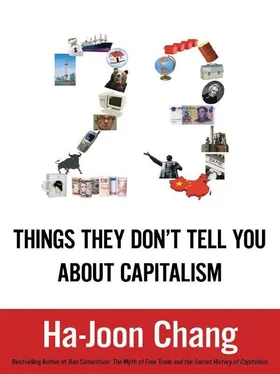In other words, economics has been worse than irrelevant. Economics, as it has been practised in the last three decades, has been positively harmful for most people.
How about the ‘other’ economists?
If economics is as bad as I say it is, what am I doing working as an economist? If irrelevance is the most benign social consequence of my professional actions and harm the more likely one, should I not change my profession to something more socially beneficial, such as electronic engineering or plumbing?
I stick to economics because I believe that it does not have to be useless or harmful. After all, throughout this book I have myself used economics in trying to explain how capitalism really works. It is a particular type of economics – that is, free-market economics as it has been practised in the last few decades – that is dangerous. Throughout history, there have been many schools of economic thinking that have helped us better manage and develop our economies.
To start from where we are today, what has saved the world economy from a total meltdown in the autumn of 2008 is the economics of John Maynard Keynes, Charles Kindleberger (the author of the classic book on financial crises, Manias, Panics, and Crashes ) and Hyman Minsky (the greatly undervalued American scholar of financial crises). The world economy has not descended into a rerun of the 1929 Great Depression because we absorbed their insights and bailed out key financial institutions (although we have not properly punished the bankers responsible for the mess or reformed the industry yet), increased government spending, provided stronger deposit insurance, maintained the welfare state (that props up the incomes of those who are unemployed) and flushed the financial market with liquidity on an unprecedented scale. As explained in earlier Things , many of these actions that have saved the world are ones opposed by free-market economists of earlier generations and of today.
Even though they were not trained as economists, the economic officials of East Asia knew some economics. However, especially until the 1970s, the economics they knew was mostly not of the free-market variety. The economics they happened to know was the economics of Karl Marx, Friedrich List, Joseph Schumpeter, Nicholas Kaldor and Albert Hirschman. Of course, these economists lived in different times, contended with different problems and had radically differing political views (ranging from the very right-wing List to very left-wing Marx). However, there was a commonality between their economics. It was the recognition that capitalism develops through long-term investments and technological innovations that transform the productive structure, and not merely an expansion of existing structures, like inflating a balloon. Many of the things that the East Asian government officials did in the miracle years – protecting infant industries, forcefully mobilizing resources away from technologically stagnant agriculture into the dynamic industrial sector and exploiting what Hirschman called the ‘linkages’ across different sectors – derive from such economic views, rather than the free-market view ( see Thing 7 ). Had the East Asian countries, and indeed most of the rich countries in Europe and North America before them, run their economies according to the principles of free-market economics, they would not have developed their economies in the way they have.
The economics of Herbert Simon and his followers has really changed the way we understand modern firms and, more broadly, the modern economy. It helps us break away from the myth that our economy is exclusively populated by rational self-seekers interacting through the market mechanism. When we understand that the modern economy is populated by people with limited rationality and complex motives, who are organized in a complex way, combining markets, (public and private) bureaucracies and networks, we begin to understand that our economy cannot be run according to free-market economics. When we more closely observe the more successful firms, governments and countries, we see they are the ones that have this kind of nuanced view of capitalism, not the simplistic free-market view.
Even within the dominant school of economics, that is, the neo-classical school, which provides much of the foundation for free-market economics, there are theories that explain why free markets are likely to produce sub-optimal results. These are theories of ‘market failure’ or ‘welfare economics’, first proposed by the early twentieth-century Cambridge professor Arthur Pigou, and later developed by modern-day economists such as Amartya Sen, William Baumol and Joseph Stiglitz, to name just a few of the most important ones.
Free-market economists, of course, have either ignored these other economists or, worse, dismissed them as false prophets. These days, few of the above-mentioned economists, except those belonging to the market-failure school, are even mentioned in the leading economics textbooks, let alone properly taught. But the events that have been unfolding for the last three decades have shown that we actually have a lot more positive things to learn from these other economists than from free-market economists. The relative successes and failures of different firms, economies and policies during this period suggest that the views of these economists who are now ignored, or even forgotten, have important lessons to teach us. Economics does not have to be useless or harmful. We just have to learn right kinds of economics.
Conclusion: How to rebuild the world economy
The daunting task ahead of us is to completely rebuild the world economy. Things are not as bad as they were during the Great Depression only because governments have propped up demand through huge deficit spending and unprecedented easing of money supply (the Bank of England has never had a lower interest rate since it was founded in 1644), while preventing bank runs through expansion of deposit insurance and the bailing-out of many financial firms. Without these measures, and the substantial automatic increase in welfare spending (e.g., unemployment benefit), we could be living through a much worse economic crisis than that of the 1930s.
There are people who believe the currently dominant free-market system to be fundamentally sound. They assume that tinkering on the margins will be a sufficient solution to our condition – a bit more transparency here, a tad more regulation there, and a modicum of restraints on executive pay over there. However, as I have tried to show, the fundamental theoretical and empirical assumptions behind free-market economics are highly questionable. Nothing short of a total re-envisioning of the way we organize our economy and society will do.
So what is to be done?
This is not a place to spell out all the detailed proposals required for the reconstruction of the world economy, many of which have been discussed in the foregoing 23 Things anyway. Here I will only outline some principles – eight of them – that I think we need to have in mind in redesigning our economic system.
To begin with:paraphrasing what Winston Churchill once said about democracy, let me restate my earlier position that capitalism is the worst economic system except for all the others . My criticism is of free-market capitalism, and not all kinds of capitalism.
The profit motive is still the most powerful and effective fuel to power our economy and we should exploit it to the full. But we must remember that letting it loose without any restraint is not the best way to make the most of it, as we have learned at great cost over the last three decades.
Читать дальше






![Ally Carter - [Gallagher Girls 01] I'd Tell You I Love You But Then I'd Have to Kill You](/books/262179/ally-carter-gallagher-girls-01-i-d-tell-you-i-lo-thumb.webp)





